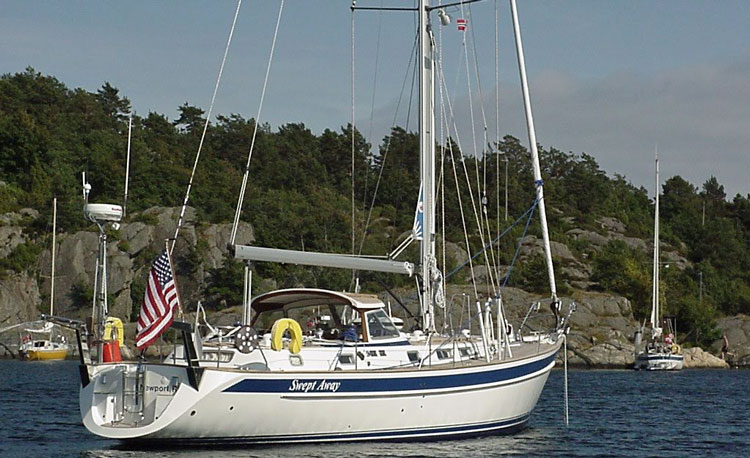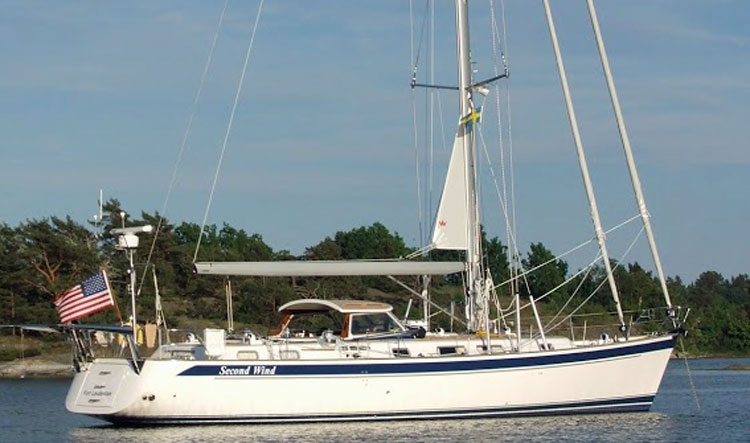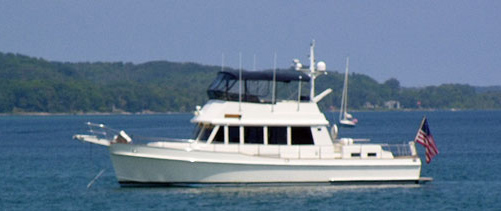 |
 |
 |
Sunday, August 4, 2013, in Gzira, Malta
Hi all. We’ve returned to Malta, where we’ll spend most or all of the rest of the season. Last time I wrote, we were still in Lefkas, Greece.
We took a final cruise to the picturesque harbor in Meganisi, and returned to a list of chores to accomplish: laundry, provisioning, returning our bikes, and getting ready for the offshore passage. We had several choices for our departure. We could do it all in day trips, to Corfu, then to Santa Maria di Leuca in the stiletto point of Italy’s south coast, and reverse the stops of our arrival, to Crotone, Roccella Ionica and Syracuse. Or we could sail overnight straight to Syracuse from Santa Maria di Leuca. It was even possible for us to sail through two nights right from Lefkas, onward far from shore, to Sicily.
In fact, that’s what the weather told us to do. Art saw some wind, a relatively rare occurrence in Mediterranean summer, and it would be a close reach from Lefkas due west to Syracuse. It would mean just the two of us for two days and two nights, but we could arrive at Syracuse’s forgiving harbor, drop the anchor, and simply sleep as long as it took to catch up. If the wind would last through at least the first day, we might even be able to anchor in Sicily by midnight the second day, and not have to go back on a watch schedule for the second night.
There were some risks to this approach. I’m vulnerable to seasickness, and winds in our face are a prime way to send me there. Art doesn’t need me to take much of a watch on a one-night voyage, but I can��t expect to spend only a few hours in the cockpit in the dark if it’s his second night offshore. And if I get sick, I normally send myself to bed and Art and whatever crew we have on board takes over. Could he do that alone for two straight nights?
The marina was quiet when we let go of the lines in the morning and stowed the fenders for seagoing. The concrete quay beside the canal by the marina was notched. Two of the notches were decorated with mournful-looking men on white plastic chairs with fishing lines dangling over the water, like figurines perched along hallway alcoves.
We entered the Ionian Sea on an early bridge opening, at 7:00 AM, and it wasn’t clear that we’d be able to sail anywhere. After a few hours, the wind came up enough to blow us westward at a moderate pace. It wouldn’t do for the entire 200-mile trip, but our hope was that it would build, and it did. At some point, we were sailing at a speed we can’t even reach under engine power.
Still, we were heeled over at a rate that wasn’t favorable to equilibrium in my inner ear, and after lunch, my stability as a crew member began to go downhill. I wasn’t as sick as I’ve been in the past, but I know my limits, and I could only provide the barest of assistance from that point until the seas flattened out about a day later.
Art reefed the jib, which straightened out the boat at the cost of a tenth or two of a knot of speed. I stopped eating for nearly twenty-four hours and wore a jacket in the summer heat. I went to bed immediately after Art ate dinner, which is our normal practice. He usually keeps himself awake until well into the night, whereupon I take over while he rests for an hour or two and then takes over the watch. It’s normal for him to sleep two or three hours in the overnight sail and make up some of the deficit in the following day.
I awoke at 12:30 and went up to the cockpit. Art looked relieved, which made me realize that it’s more of a struggle than he lets on to stay up until his normal 2:00 surrender. He told me that he’d been watching the Milky Way from the time it got dark, very dark this many miles from shore lights, until the moon, nearly full, rose and illuminated the sea, dulling the sky. He seemed a little punchy to me, actually, like someone who had been living in the wild for months on end.
Managing to stay upright, and grateful I hadn’t eaten or drunk anything since lunchtime, I kept watch until Art showed up again an hour and a half later. I’m embarrassed to confess that when he generously tells me that I should go to bed, I always do. When he asked me to take over again at 4:00 AM, I scrambled to my post.
We’d also lost access to Internet services for many hours, and it would be many more before emails would start pouring back in to my BlackBerry. We listened to podcasts I’d downloaded in the previous weeks, and Art busied himself with our ancient iPod when I was off sleeping somewhere, surprisingly often, no doubt due to my delicate state.
Apparently, in our favor, the Lefkas-to-Syracuse shipping route had lost some popularity since the time of Odysseus; we didn’t see a single boat light during the night or another vessel that might come close in either daytime sail. By midnight on the second night, we arrived in Syracuse harbor. The lights from the now-visible shore made the Milky Way paler than it had shown itself to Art the night before, but the moon still made a fiery red arrival from the horizon.
For safety, we anchored far away from the rest of the cruisers, and far away from the town. We thought we might re-anchor in the morning, in case we wanted to go ashore, but we decided instead to stay well across the harbor, and spend a day doing absolutely nothing. We were very successful.
In the morning, we pulled up the anchor and motored with a lake around us, along Sicily’s coast to Marzamemi. This would be our third visit to the small resort town. On our first stop, we hadn’t even left the marina. But we found ourselves there again last year, with Dave and Patti onboard, and discovered a small real town that was worth visiting and a tiny resort town that was simply charming. This time around, we had some days in hand, and no company.
I didn’t remember the parade of sunken fishing boats in the entrance, each diagonally upended like children’s building blocks, no doubt the result of a winter storm. Inside the marina area, the work boats docked and anchored were unusually flat-bottomed and wide for their visits to the fish farms south of the harbor.
The marina itself ranks higher than many in Sicily, in my assessment. The dock crew is capable, energetic, and well-staffed. The spot that they’d earmarked for us hadn’t been cleared when we arrived in the morning, so they rafted us to a boat near the T-head of the floating dock. I hardly had any work to do; one dock person jumped aboard our rafting partner and traded lines with me until we were secure.
Moments after the berth was available, the dock guys were back, guiding us into the berth, handling the mooring lines and our stern lines, and working from the boats on either side of us to make sure that we were secure and comfortable.
The marina has reasonable prices, even low prices compared to places like Ragusa and Licata in smaller towns. There’s a tiny restaurant on the premises, perfect for second breakfast, or afternoon granitas, or casual meals. The marina WiFi is free, and so are the bikes to use for jaunts to the resort village or the real town. I think that the marina also offered to drive us to the supermarket if we needed that sort of support. Our conversations are always completely in Italian, so I’m never sure that the transactions went as I imagined, or if I accidentally promised to buy somebody a car.
The bikes didn’t have baskets, or helmets, or locks. But you don’t need a basket because there’s little to acquire; you don’t need a helmet because traffic is sparse and some of the roads are blocked off to cars, and you don’t need a lock, because these bikes are just a wreck. Nobody would take them. After our month of rental bikes in Lefkada, locking them together everywhere (although the rental firm thought I was crazy to want a lock), it was liberating to simply get off of the bike and set it on the kickstand, and go do something else.
I began to become attached to this poor bike, slung low to the ground, with brakes that I had to hunt down every time I got on it. For some reason, the process to get it moving always put me in mind of Fred Flintstone and his prehistoric car.
On our first day, we rode the bikes to the resort town twice, once in search of lunch, and once after dinner. During the hot and sunny afternoon, the old warehouses surrounding the main square look like the 1970 Cuba I imagine and resemble the actual 1990 downtown Miami.
On previous visits, we hadn’t yet been in town in the evening, and there’s an atmospheric change once the sun goes down. In the afternoon, the place was asleep, the crumbling warehouses parched and ignored, and the town square under a thorough cleaning after a film festival had closed up shop. But back in the square in the evening, the mood was magical. Restaurants lined the piazza, in a race to generate the most romance. Candles twinkled on tables, casting a glow over cloths and sparkling glassware. The dilapidated warehouses were softly lit with subdued candle flame. The dinner crowd began to drift in at about ten o’clock.
Over a few days, we decided on a favorite place to have lunch, a favorite place to buy fruit, but we showered the town with our patronage for morning coffee and afternoon granite. These frosty hybrids of drink and dessert take us back immediately to childhood summers and paper cups. In time, we migrated from lemon flavor to pistachio, a local favorite that looks as though it escaped from a witch’s lair in a fairy tale and tastes nutty and urbane.
On our last day in the marina, the parking lot was filled with official vehicles – Coast Guard, police, immigration – and the pier alongside the docks was lined with people, men, it seemed to me, although we were told that many involved were children. A sailboat had come from somewhere else, crammed with illegal immigrants, or clandestini, as we saw in a different story about nearby Portopalo while we scanned the local newspaper.
The boat itself was not very big, maybe in the low-thirty-foot range. Art wondered if it had itself been stolen. The immigrants in the Portopalo story were from a range of countries, primarily the Middle East; maybe this was the origin of the despondent-looking group I saw there. I imagined how difficult it would be to scrape up the funds to give to the smugglers, how rough the trip. We pick our weather carefully and I still get seasick, and I don’t have to stand for days among a human blob.
I think about how lucky we’ve been to be born into our circumstances, our country, the year, the middle class, the state of technology, the treatment of minorities and women, all of it. So I returned to Malta counting my blessings.
The one blessing we didn’t have was wind. After a few hours of breeze, we motored, as forecast, back to the marina that’s been our home base in Malta.
We’re back in our Malta routine already, and we think we’ll head to the movies this afternoon. Hope you’re having lots of summer fun.
Love, Karen (and Art)